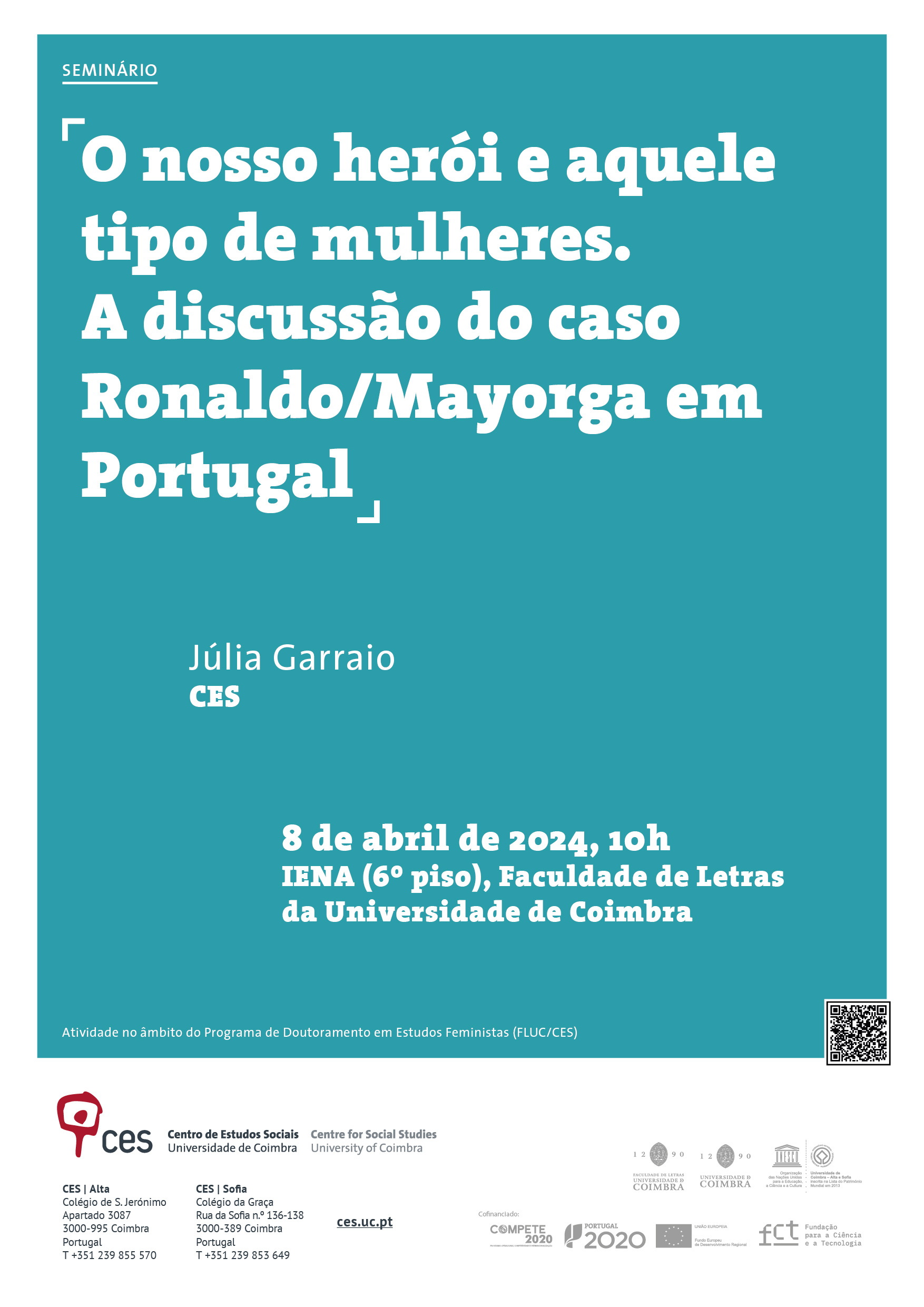Seminário
O nosso herói e aquele tipo de mulheres. A discussão do caso Ronaldo/Mayorga em Portugal
Júlia Garraio (CES)
8 de abril de 2024, 10h00
IENA (6º piso), Faculdade de Letras da UC
A entrevista de Kathlyn Mayorga à revista Der Spiegel em que afirmava ter sido violada por Cristiano Ronaldo foi recebida com descrença em Portugal, provocando uma onda de apoio ao ícone do futebol nacional. Mayorga foi frequentemente retratada como mulher interesseira e não credível que se teria aproveitado do momento #MeToo para extorquir “mais dinheiro” ao futebolista milionário.
Neste seminário pretende-se discutir como certas normas tradicionais de género, determinados imaginários de sexualidade e alguns mitos da violação permitiram reinterpretar a acusação de violação num caso de extorsão, em processos discursivos que implicavam a normalização do abuso sexual de “mulheres imorais”. Ir-se-á discutir como a intersecção de tradições patriarcais locais com a ordem neoliberal produziu uma moralidade que normalizou a mercantilização dos corpos como forma de ascensão social. Primeiro, analisar-se-á a mercantilização do corpo de Ronaldo -enquanto “super-corpo” e chave para o êxito profissional- e como o desempenho desportivo excecional lhe facultou respeitabilidade, um estatuto social privilegiado e o acesso aos corpos sexualizados das mulheres. A seguir, analisa-se a construção discursiva do corpo de Mayorga como um corpo sexualizado de menor valor moral e/ou comercial, a atuar numa área profissional considerada indecente, e cujos danos infligidos seriam passíveis de serem compensados através do dinheiro.
Neste seminário apresentam-se resultados parciais de investigação realizada no quadro dos projetos UnCoveR: Violência sexual nas paisagens mediáticas portuguesas (DOI 10.54499/2022.03964.PTDC) e Dis/entangling Rape: Violência Sexual na literatura e no cinema portugueses do século XXI (DOI 10.54499/2022.05885.CEECIND/CP1754/CT0003).
Sugestões de leitura:
Garraio, J., Santos, S.J., Amaral, I. & Carvalho, A.S. (2020). The unimaginable rapist and the backlash against #MeToo in Portugal. Europe Now: A Journal of Research and Arts. https://www.europenowjournal.org/2020/03/09/the-unimaginable-rapist-and-the-backlash-against-metoo-in-portugal/
Garraio, J., Amaral, I., Simões, R.B. & Santos, S.J. (2023). Forward and backwards Sexual violence in Portuguese news media. In K. Boyle e S. Berridge (org.), The Routledge Companion to Gender, Media and Violence. London: Routledge.
Garraio, J. (2023). Our Hero and That Kind of Woman: Imaginaries of Sexuality, Masculinity and Femininity in the Discussion of the Rape Allegation against Cristiano Ronaldo in Portugal. Social Sciences, 12(8):461, https://doi.org/10.3390/socsci12080461.
Silveirinha, M.J., Simões, R.B. & Santos, T. (2020). Him too? Cristiano Ronaldo and the news coverage of a rape case allegation. Journalism Practice 14: 208–24. https://doi.org/10.1080/17512786.2019.1693279
Nota biográfica
Júlia Garraio é investigadora do Centro de Estudos Sociais da Universidade de Coimbra, onde integra a linha temática Democracia, Justiça e Direitos Humanos. Cocoordena os Grupos de Trabalho Policredos: Religiões e Sociedade e GPS - Grupo de Pesquisa em Sexualidade. Desenvolve o projeto Dis/entangling Rape - Sexual Violence in Portuguese literature and cinema in the 21st century, no âmbito do Programa de Estímulo ao Emprego Científico (CEEC) da FCT. É CoPI do projeto FCT UnCoveR - Sexual Violence in Portuguese Mediascape. Integrou o Grupo de Investigação Histórica da Comissão Independente para o Estudo dos Abusos Sexuais de Crianças na Igreja Católica Portuguesa. É membro cofundador do grupo de investigação internacional SVAC-Sexual Violence in Armed Conflict. Faz parte do Conselho Editorial da revista European Journal of Women's Studies, onde é coresponsável pela secção das recensões. Fez parte da equipa de vários projetos nas áreas dos Estudos de Memória, Estudos de Género, Media, Literatura e Estudos Culturais.
Atividade no âmbito do Programa de Doutoramento em Estudos Feministas (FLUC/CES)


